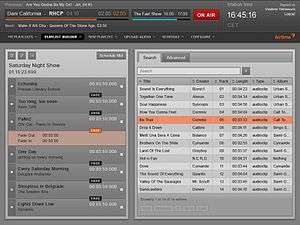Airtime (software)
Airtime is a [2] radio management application for remote broadcast automation (via web-based scheduler), and program exchange between radio stations. Airtime is being developed and released as free and open-source software, subject to the requirements of the GNU General Public License (GPL), version 3 or any later.
 | |
 | |
| Developer(s) | Sourcefabric |
|---|---|
| Initial release | 2011 |
| Stable release | 2.5.2.1
/ April 8, 2015 |
| Repository | |
| Written in | Python, PHP, JavaScript |
| Operating system | Linux |
| Available in | English, Czech, Deutsch, Hungarian, Croatian, Serbian, Spanish, French, Italian, Korean, Polish, Portuguese, Russian, Chinese, Greek |
| Type | Radio automation software |
| License | GNU General Public License v3[1] |
| Website | airtime.sourcefabric.org |
History
The initial concept for Airtime, originally named LiveSupport, and then Campcaster was developed in 2003 by Micz Flor, a German new-media developer. The concept was further developed by Ákos Maróy, a software developer and then-member of Tilos Radio, Robert Klajn, a radio producer at Radio B92, and Douglas Arellanes and Sava Tatić from the Media Development Loan Fund (MDLF). The initial development was financed from a grant from the Open Society Institute's Information Program, through its ICT Toolsets initiative. The development was originally coordinated by MDLF through its Campware.org initiative, now spun off as the independent not-for-profit organisation Sourcefabric.
In January 2011, Sourcefabric announced a rewrite of Campcaster, beginning with the 1.6 beta release.[3] The new product, known as Airtime, replaced the C++ scheduler of Campcaster with Liquidsoap, and includes a drag and drop web interface based on jQuery.[2]
Airtime 1.8.1 was released on May 3, 2011[4] following up on releases 1.7 and 1.8 in April. The ability to edit shows was introduced, show repeat and rebroadcast made possible, and the calendar improved with reported loading times five to eight times faster. Airtime's default output stream became Ogg, rather than MP3.
SoundCloud support, allowing users to automatically upload recorded shows, was announced in May 2011.[5]
Airtime 1.8.2 was released on June 14, 2011 with improvements to installation, upgrade, file upload limit and the interface.[6]
Airtime 1.9 was released on August 10, 2011 with a new file storage system that allowed users to set 'watch' folders, to synchronise files and to browse their audio archives. Also added were SHOUTcast support, a one line Ubuntu install command and improved front-end widgets. 1.9.4 was released on September 27 with DEB packages for Ubuntu and Debian.[7]
The Airtime 2.0 release on 25 January 2012 added new features including stream configuration through the browser, live stream preview, and uploading of any audio file to SoundCloud.[8]
On 5 June 2012, Airtime 2.1 added live stream rebroadcasting from remote sources and on-the-fly editing of live shows in a revised Now Playing interface.[9] A bugfix update 2.1.2 was released on June 18.
Airtime 2.2 added smart blocks, live assist features and new streaming capabilities and was released on 29 October.[10]
Airtime 2.5.2 added a new / rewritten installer, stability improvements and several new APIs. Released on April 9 of 2015.[11]
Stalled Development and LibreTime Fork
In August 2016 a representative from the Sourcefabric development team released a statement that their focus for Airtime had shifted primarily to its SaaS offering to increase revenue stream, with hopes to concentrate on the open source project in the future. He mentioned the possibility of forking the project.[12] In 2017, a group of broadcasters made the announcement of a new fork to continue open source development of the software under the new moniker LibreTime.[13]
Awards
In September 2011, Airtime was nominated as one of five finalists in the Packt Open Source Awards 2011 in the Multimedia category.[14] In 2012, Airtime won the Guardian Awards for Digital Innovation in the category Best Use of Technology for Social Change.[15]
West Africa Democracy Radio won a Knight-Batten Award for Innovations in Journalism in July 2011, with Airtime cited as part of the platform.[16]
Radio stations using Airtime
On 18 January 2011, Resonance FM announced in Issue #324 of UK music magazine The Wire a partnership with Sourcefabric to help "with testing the software and developing new features."[17]
West Africa Democracy Radio (WADR) launched a news platform that incorporated Airtime on April 1, 2011.[18] Catalyst Radio announced the use of airtime for organising and broadcasting transmission content on June 13, 2011.[19] Stress FM, a radio station based in Lisbon, uses Airtime to program its transmissions.
Among the Creative Commons oriented Web Radios, supporting the sharing of free music we can mention [20] Zootcast Radio, a project created two years back from an Italian Open Cultural Association.
From July 15, 2012 Airtime uses Russian radiostation of international modern intelligent music Playpoint.fm
References
- Project page on Sourceforge
- "Airtime Overview".
- "New open source organization is dedicated to quality journalism".
- "Airtime Goes Automatic For The People with 1.8.1".
- "Sourcefabric and West Africa Democracy Radio have added SoundCloud support to Newscoop".
- "Airtime: open source software for radio stations". Archived from the original on 25 August 2011.
- "Open Source Radio Station Management Software Airtime Sees New Release".
- "What's new in Airtime 2.0".
- "Airtime 2.1 adds real-time show edit and live stream rebroadcast".
- "Sourcefabric's Airtime 2.2 gets smart blocks". Archived from the original on 8 December 2013.
- "Github Release Announcement".
- "Airtime Development Status // Summer 2016".
- "LibreTime: A Fork of AirTime due to stalled development".
- "Open Source Multimedia Software Award 2011".
- "Guardian Awards for Digital Innovation - winners 2012". The Guardian. London. 23 March 2012.
- "2011 Knight-Batten Award Winners". Archived from the original on 2011-08-09. Retrieved 2011-08-10.
- The Wire, Issue #324, February 2011 edition, pg. 76.
- "West Africa Democracy Radio launches open source news platform".
- "Catalyst Radio: About Us". Archived from the original on 2012-08-17. Retrieved 2011-06-16.
- "Zootcast: About Us".